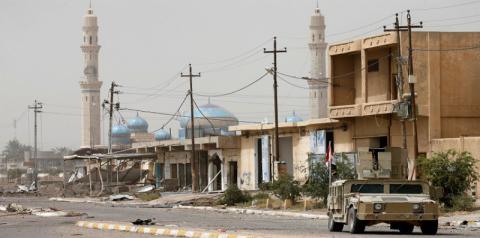Iraq: Alkarama Calls Upon the UN to Establish a Commission of Inquiry on the Crimes Committed by Iraqi Security Forces and Affiliated Militias in Fallujah

On 23 June 2016, Alkarama wrote to the High Commissioner for Human Rights Zeid Ra'ad Al Hussein, deploring the summary executions, enforced disappearances and torture by the Iraqi military forces and state-sponsored militias – including those belonging to the "People's Mobilisation Unit", an umbrella organisation of about 40 militias under the effective control of the Prime Minister – directed against the civilian population fleeing Fallujah.
In particular, Alkarama is concerned that since the launch of the 'Operation Breaking Terrorism' on 22 May 2016 against the 'Islamic State' (IS), it has received testimonies according to which Sunni civilians fleeing from the besieged city of Fallujah were lined up and shot dead under the pretext that "they were supporting IS" while other hundreds of local residents were detained in order to "determine their involvement with IS" and severely tortured, including by beatings, flogging, and being dragged by armoured military vehicles.
Not only did the Iraqi security forces and militias not discriminate between combatants and civilians, but instead chose to punish a whole population for having previously lived under IS rule. Such a practice constitutes a form of collective punishment specifically targeting Sunni populations on the sole basis of their religious affiliation.
Such failures to abide by the fundamental principles enshrined in international human rights law and humanitarian law clearly amount to war crimes according to article 8 of the Rome Statute of the International Criminal Court (ICC). In addition, as several elements point out to a publicly expressed intent of these forces' command to specifically target the Sunni population of Fallujah, these crimes may constitute crimes of genocide under article 2 of the 1948 Convention on the Prevention and Punishment of Genocide.
Indeed, in a video published on 24 May 2016, the Secretary-General of the Abu Fadhl Al-Abbas Brigades – which belongs to the People's Mobilisation Unit – Aws al-Khafaji, accuses the inhabitants of Fallujah of being "all terrorists". He adds that it is now the "opportunity to cleanse" Iraq from the "tumour" of Fallujah. The city has been considered as irreverent by the central authority when, in late 2013, it became the theatre of peaceful protests denouncing the government's marginalising policies against the Sunni population and abusive use of counterterrorism laws, which were violently repressed by the security forces.
Alkarama thus asked the High Commissioner for Human Rights that he calls upon the Human Rights Council (HRC) to establish an independent international commission of inquiry for Iraq. Indeed, Alkarama recalled the absence of political will to investigate serious human rights violations committed in the country over the past years, despite official declarations. Despite the recommendations issued in the report of the Office of the United Nations High Commissioner for Human Rights on the human rights situation in Iraq of March 2015, no investigation has ever been opened into the crimes committed by these militias.
Alkarama further urged the High Commissioner that he calls upon the Security Council (UNSC) to refer the situation in Iraq to the ICC – as his predecessor Ms Navi Pillay had done for the Libyan and Syrian situations – taking into account the evidence that point out to the commission of war crimes and crimes of genocide.
Alkarama believes that injustice and impunity can only create a breeding ground for terrorism, and that in order to tackle it, the authorities must put an end to their sectarian policies and uphold the principle of equality between all Iraqi citizens.
For more information or an interview, please contact media@alkarama.org (Tel: +41 22 734 1008).
